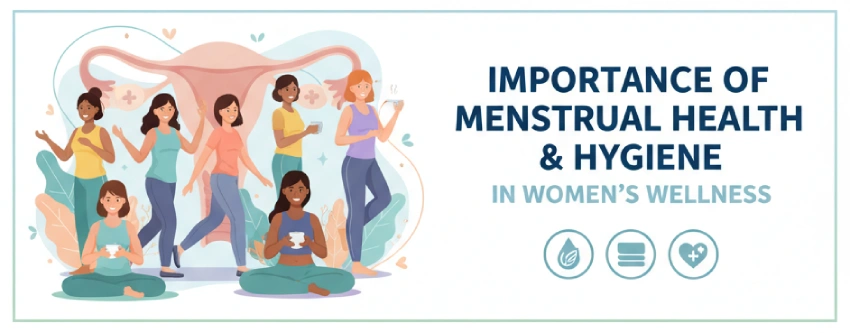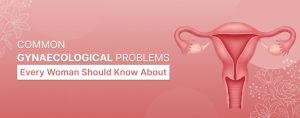Menstrual health is a vital part of women’s overall well-being, yet it continues to be overlooked due to stigma and lack of awareness. This gap in knowledge often leads to unsafe practices and preventable health problems.
In India, research shows that over half of adolescent girls face health issues linked to poor menstrual hygiene, highlighting how silence and misinformation directly affect women’s wellness. Globally, the World Bank estimates that 500 million women still lack access to safe products and facilities, showing the scale of the challenge.
Menstrual health is not only about hygiene; it is about dignity, education, and equality. Creating awareness, improving access to safe products, and breaking myths are key steps towards healthier and more empowered women.
Why Menstrual Health Matters?
Menstrual health is directly linked to reproductive health. Poor hygiene can increase the risk of reproductive tract infections, which may affect fertility and long-term gynaecological health. Beyond the physical aspect, menstruation can also influence emotional well-being. Anxiety about leaks, odour, or stigma often affects confidence. Poor menstrual hygiene is associated with stress, absenteeism, and withdrawal from daily activities. By adopting simple menstrual hygiene tips women can maintain their health, participate fully in society, and pursue education and career goals without unnecessary barriers.
Common Menstrual Health Issues
Menstrual health is an important aspect of women’s overall well-being, yet many often face challenges during their monthly cycles that go unnoticed or untreated. Understanding these issues can help in early management and better self-care.
1. Irregular periods
Many women experience irregular cycles at some point in their lives. Factors like stress, sudden lifestyle changes, weight fluctuations, or hormonal imbalances can disrupt the menstrual cycle. In some cases, conditions like Polycystic Ovary Syndrome (PCOS) or thyroid disorders may also be responsible.
2. Heavy bleeding
Excessive bleeding during periods, known as menorrhagia, can interfere with daily life and may be a sign of underlying health concerns such as fibroids, hormonal imbalance, or other reproductive system issues. Consulting a gynaecologist is important if heavy bleeding becomes frequent.
3. Infections due to poor hygiene
Maintaining menstrual hygiene is crucial. Using unclean sanitary products or not changing them frequently enough can increase the risk of infections. This may lead to urinary tract infections (UTIs), yeast infections, or bacterial vaginosis, causing discomfort, itching, and odour. Following the right menstrual hygiene tips women can significantly reduce such risks and promote better intimate health.
4. PMS and mood disorders
Premenstrual Syndrome (PMS) is very common and can bring symptoms like bloating, irritability, fatigue, or anxiety. For some women, these mood disturbances can be severe, sometimes leading to conditions like Premenstrual Dysphoric Disorder (PMDD). Managing stress, adopting healthy habits, and seeking medical advice can help reduce the intensity of these symptoms.
Promoting Better Menstrual Health
Menstrual health is more than just hygiene—it impacts education, work, and overall well-being. By improving awareness, access, and support, we can create a healthier and stigma-free environment for women and girls.
1. Breaking the Silence Around Periods
Encouraging open conversations helps reduce stigma. When periods are discussed without hesitation, women feel more confident in managing their health.
2. Improving Access to Menstrual Products
Affordable, safe, and easily available menstrual products are essential. Public initiatives and community efforts can help reach women in underserved areas.
3. Education and Awareness
Knowledge about menstrual health empowers women to make informed choices. School-based education ensures young girls understand their bodies from an early age.
4. Safe Sanitation Facilities
Clean toilets, disposal systems, and water access are vital. Poor facilities often prevent girls from attending school and women from fully participating at work.
5. Healthcare Support and Guidance
Ignoring menstrual disorders can worsen health outcomes. Access to doctors and timely medical advice ensures early detection and better management.
Conclusion
Menstrual health and hygiene are central to women’s physical, emotional, and social well-being. By prioritising proper practices, women can prevent infections, protect reproductive health, and maintain dignity and confidence. Beyond the individual, menstrual hygiene also impacts education, economic independence, and global sustainability goals. By following simple menstrual hygiene tips women can safeguard their health, enhance confidence, and lead fuller lives.
Frequently Asked Questions
1. What is menstrual hygiene?
Menstrual hygiene refers to the practices women and girls follow during their periods to stay clean, safe, and comfortable. It includes using clean sanitary products, changing them regularly, and maintaining personal hygiene.
2. Why is menstrual health important for women?
Good menstrual health is vital because it helps prevent infections, protects reproductive health, supports emotional well-being, and allows women to live with dignity and confidence during their cycles.
3. What are the best menstrual hygiene practices?
Some of the best practices include washing hands before and after changing products, changing pads or tampons every 4–6 hours, washing the genital area daily with mild soap and water, wearing breathable cotton underwear, and disposing of used products safely.
4. How often should sanitary pads be changed?
Sanitary pads should usually be changed every 4–6 hours, or sooner if they are soaked. Regular changing prevents bacterial growth, odour, and infections.
5. What are eco-friendly menstrual products?
Eco-friendly options include reusable menstrual cups, cloth pads, and biodegradable sanitary pads. These products reduce waste, are cost-effective in the long run, and are safe when cleaned and used properly.
6. What are the early signs of poor menstrual hygiene?
Early signs may include itching, rashes, unusual odour, abnormal discharge, or frequent urinary and vaginal infections. Seeking medical advice early can prevent complications.
7. Can poor menstrual hygiene affect fertility?
Yes. If infections caused by poor hygiene are left untreated, they may affect the uterus, fallopian tubes, or ovaries, which can impact fertility in the long term.
8. How do I prevent rashes and irritation from sanitary pads?
To prevent rashes, change pads frequently, use breathable underwear, and choose pads without strong fragrances. Applying a mild soothing cream recommended by a doctor can also help if irritation occurs.
9. What should I keep in a menstrual hygiene kit?
A menstrual hygiene kit should include sanitary products (pads, tampons, or cups), tissues or wipes, hand sanitiser, a small pouch for disposal bags, and a spare set of underwear. This helps you stay prepared and comfortable during your period.
Medically Reviewed by — Dr. Dipti K. Yadav ( Associate Director – Obstetrics & Gynaecology )













